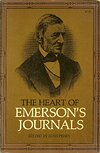
Bliss Perry (1860–1954)
Autor(a) de The Heart of Emerson's Journals
About the Author
Obras de Bliss Perry
Little Masterpieces: Ralph Waldo Emerson — Editor — 3 cópias
Fishing with a Worm 1 exemplar(es)
The American Mind and American Idealism 1 exemplar(es)
The Complete Poetical Works of Lord Byron: Cambridge Edition 1 exemplar(es)
The Broughton house 1 exemplar(es)
Lectures on Criticism and the Essay 1 exemplar(es)
Associated Works
Etiquetado
Conhecimento Comum
- Data de nascimento
- 1860-11-25
- Data de falecimento
- 1954-02-13
- Sexo
- male
- Nacionalidade
- United States of America
- Local de nascimento
- Williamstown, Massachusetts, USA
- Local de falecimento
- Exeter, New Hampshire, USA
- Locais de residência
- Williamstown, Massachusetts, USA (birth)
Exeter, New Hampshire, USA (death) - Educação
- Williams College
University of Berlin
University of Strasburg (now University of Stasbourg, France) - Ocupação
- professor
editor
critic
literary historian
essayist
novelist (mostrar todas 8)
short-story writer
autobiographer - Organizações
- American Academy of Arts and Letters (Literature, 1905)
Membros
Resenhas
Listas
Prêmios
You May Also Like
Associated Authors
Estatísticas
- Obras
- 50
- Also by
- 7
- Membros
- 345
- Popularidade
- #69,185
- Avaliação
- 3.9
- Resenhas
- 2
- ISBNs
- 61
- Idiomas
- 1













